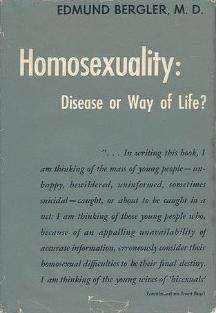Homosexuality: Disease or Way of Life?
 Cover of the first edition | |
| Author | Edmund Bergler |
|---|---|
| Country | United States |
| Language | English |
| Subject | Homosexuality |
| Published | 1956 (Hill and Wang) |
| Media type | Print (Hardcover and Paperback) |
| Pages | 302 (hardcover edition) |
| ISBN | 978-0020753209 |
Homosexuality: Disease or Way of Life? is a 1956 book about homosexuality by the psychoanalyst Edmund Bergler,[1] in which Bergler argues that homosexuality is a disease and that legal restrictions on homosexuality are necessary. The book provoked rage.
Summary
Bergler argues that homosexuality is a disease.[1] According to him, homosexuals are a small, psychotic group of people, maladjusted and self-indulgent. He believes that people become homosexual only because of the glamorization of homosexuality.[2] As described by Bayer, he asserts that homosexuals tend to be "unreliable troublemakers and 'injustice collectors', having a deep wish to suffer."[1] Bergler believes that a homosexual orientation can be changed.[3] He considers legal restrictions on homosexuality necessary.[4]
Sex researcher Alfred Kinsey is dismissed by Bergler as a "medical layman". Bayer summarizes Bergler as claiming that "as a result of [Kinsey's] influence, homosexuals have become so outspoken that 'they are now virtually asking for minority status.'[1]
Scholarly reception
Homosexuality: Disease or Way of Life?, unlike previous works by authors who had argued that homosexuality is a disease, was greeted by what Bayer describes as "an outpouring of denunciatory rage", signaling a shifting tone in the discussion of psychiatry within the homophile movement.[1] The Mattachine Review and the Ladder published articles critiquing the book in 1957 and 1958. Influenced by the work of Evelyn Hooker, Bayer writes, the critics argued "that Bergler had drawn his conclusions from an unrepresentative sample of homosexuals."[1]
Though some reviewers distinguished Bergler from more responsible psychiatrists, others perceived him as representative of the psychiatric profession. Bayer adds that there was recognition that Bergler's work could be used by those opposed to the advancement of homosexual rights.[5]
Homosexuality: Disease or Way of Life? (1956) was cited in Irving Bieber et al.′s Homosexuality: A Psychoanalytic Study of Male Homosexuals (1962). Bieber et al. mention Bergler briefly, noting that like Melanie Klein, he regarded the oral phase as the most determining factor in the development of homosexuality.[6]
References
Footnotes
- 1 2 3 4 5 6 Bayer 1987. p. 78.
- ↑ Terry 1997. p. 277.
- ↑ Reilly 2014. pp. 134-5.
- ↑ Isay 1989. p. 136.
- ↑ Bayer 1987. pp. 78-79.
- ↑ Bieber 1962. pp. 6, 351.
Bibliography
- Books
- Bayer, Ronald (1987). Homosexuality and American Psychiatry: The Politics of Diagnosis. Princeton: Princeton University Press. ISBN 0-691-02837-0.
- Bieber, Irving (1962). Homosexuality: A Psychoanalytic Study of Male Homosexuals. New York: Basic Books.
- Isay, Richard A. (1989). Being Homosexual: Gay Men and their Development. London: Penguin Books. ISBN 0-14-017488-5.
- Reilly, Robert B. (2014). Making Gay Okay: How Rationalizing Homosexual Behavior Is Changing Everything. San Francisco: Ignatius Press. ISBN 978-1-58617-833-8.
- Terry, Jennifer (1997). Rosario, Vernon A., ed. Science and Homosexualities. New York: Routledge. ISBN 0-415-91502-3.